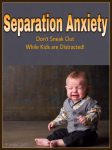5 Tips for Helping Kids with Nighttime Fears
September 24, 2017|Posted in: Happy, Healthy, Smart Kids!
Helping Kids with Nighttime Fears – A Guest Post by Neve from We the Parents – http://wetheparents.org.

“Just one more story. I’m hungry, can I get some food? I need a drink of water. Please stay, Mommy!”
Every child has their toolbox of excuses and reasons to delay bedtime. However, it can be heart-rending when you know they are actually afraid and this is why they don’t want to be left alone.
Nighttime fears are very common. A Dutch study (Muris et al 2001) found more than 73% of kids aged 4-12 years experienced them. It’s little surprise when you think about it; young children have fertile imaginations and are unable distinguish reality from fantasy.
Have no fear! Here are five actionable tips to help you support your child through nighttime fears:
Bedtime routine and rituals
Consistent and predictable routines allow children to feel safe and develop a sense of confidence and control in their lives. Knowing what’s coming next is comforting. This is especially true at night when tired minds are more likely to be worried.
Try to create peaceful and calm bedtime rituals: a bath, a soothing story, and maybe a song and a few minutes sitting silently by their bed. The comforting sameness of the routine will help to soothe anxieties and soften the journey from awake to asleep.
Listen, empathize and reassure
It can test the patience of any parent when it’s late and your child won’t go to sleep. Especially, if their fears seem unreasonable. Resist the temptation to challenge them by asking “Why are you afraid?” or saying “There’s nothing to be scared of.” No one wants to defend or justify their feelings. Instead, hear them out. Acknowledge their fear and reassure them. You might reply, “I know that you are feeling scared right now. It’s not nice for you. I know what it’s like to be afraid and I’m going to help you.” This approach will help create a safe space in which they are comfortable to share their anxieties. And this in turn will often reduce them significantly.
Teach mindfulness and knowledge
A powerful mindfulness tip is to separate our emotions from ourselves. You can help your child to do this with their worry. Get them to list their fears. Then tell them, “Worry is saying this to you. How true do you think these things are?”
Creating some distance between worry and themselves can diminish the anxiety. You can then look at the fears and fact check them. This might involve demonstrating that there are no monsters in the closet, or, if they are a bit older, you could explore the difference between reality and fantasy.
Calmly repeat this process and you will nurture your child’s inner resilience and ability to manage their own anxiety.
Create a comforting environment
A few touches will promote peacefulness and calm. Keep the door ajar. Invest in a soft, warmly colored night light. (Avoid stark white or blue lights which inhibit melatonin production and keep the body awake.) Try playing soft music or gentle audiobooks.
Unsurprisingly, studies have shown that children who sleep close to their mothers have fewer nightmares (Simard et al 2008). It’s worth thinking about when planning the details of a child’s move into their own room.
A comfortable bed is also important. If your little one is in a crib, then make sure they have a decent breathable, crinkle-free mattress. I’ve written a whole guide on these if you’d like to know more.
Cuddly toy
Sleeping with a comfort toy such as a teddy bear or doll reduces nighttime fears. It may seem obvious or trivial but it’s been confirmed by scientists (Kushnir and Sadeh 2012). Encourage it and don’t worry about kids depending on it in the future.
Wrapping up
Nighttime fears are common and, for many children, just another part of growing up. If you are concerned they are becoming more than a developmental issue and are perhaps turning into an anxiety problem, then contact a family healthcare provider. Otherwise, don’t beat yourself up trying to ‘fix’ them. Respectfully listen, empathize, and do what you can to create a peaceful environment and a predictable bedtime routine. With care and support, your child will naturally move beyond this phase.
You might also enjoy reading
Teaching Kids to be Trustworthy
Never Sneak Out While Baby is Distracted
Here are some related products from Amazon that you might like. Just click on the photo or the description to be redirected to Amazon where you can purchase the products.
1 Comment
Leave a Reply
*







Ricky jonson
December 20, 2018
I have already read your good thought and I am so happy with your quality writings. I have lots of ideas and good blogs on my side. You are so invited on my side.
Thank you.